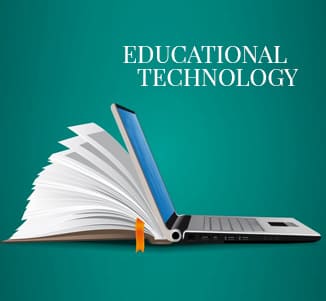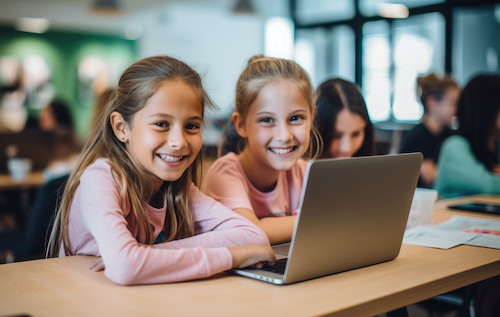Ingenious Approaches for Enhancing Technology Education and learning in Today's Learning Environments
The evolving landscape of technology education and learning requires a reevaluation of traditional pedagogical strategies to much better equip students for the intricacies of the modern-day world. Ingenious methods, such as hands-on discovering experiences and collaborative project-based campaigns, play a critical role in bridging theoretical concepts with practical applications. Additionally, the combination of on-line sources and gamification can improve interaction and motivation amongst learners. As we check out these methodologies, it comes to be essential to take into consideration how tailored learning can better improve the academic experience and cultivate a deeper link in between pupils and modern technology. What might this imply for the future of education and learning?
Hands-On Learning Experiences
Hands-on understanding experiences act as a foundation in modern technology education and learning, efficiently linking the gap in between academic understanding and useful application. These experiential tasks make it possible for pupils to involve straight with devices, software program, and innovation, fostering a much deeper understanding of concepts that are frequently abstract in traditional classroom setups.
By incorporating hands-on knowing, educators can facilitate a setting where trainees can experiment, innovate, and troubleshoot. This approach not just cultivates technical skills yet additionally boosts problem-solving capacities, as pupils are encouraged to confront real-world difficulties. Moreover, hands-on experiences frequently bring about enhanced pupil motivation and involvement, as students see the prompt importance of their studies to practical circumstances.
Furthermore, such experiences can take various types, consisting of laboratory experiments, simulations, and interactive jobs, all of which deal with various discovering designs. The integration of hands-on learning in innovation education likewise advertises retention of information, as pupils are most likely to bear in mind principles they have actually proactively dealt with as opposed to passively observed. In general, hands-on experiences are essential in preparing trainees for the intricacies of the modern-day technical landscape, outfitting them with the skills and self-confidence needed to do well in their future professions.
Collective Project-Based Knowing
Collective project-based understanding empowers pupils to collaborate in teams to address facility, real-world issues, fostering important abilities for the modern labor force. This method motivates energetic interaction, crucial reasoning, and creativity, as trainees discuss roles, share responsibilities, and jointly develop options. By submersing themselves in tasks that reflect genuine obstacles, students establish a deeper understanding of the subject while refining their capacity to communicate and team up properly.
In modern technology education and learning, joint project-based discovering can manifest with interdisciplinary jobs that include components of layout, design, and coding. As an example, students might work together to produce a mobile application or layout a prototype that addresses a social problem, needing them to incorporate different technological principles and tools. This experiential understanding not only enhances technical effectiveness however likewise cultivates problem-solving abilities and adaptability.
Furthermore, such joint endeavors promote a feeling of neighborhood amongst pupils, promoting interpersonal relationships and a common dedication to their task results. As they browse the complexities of team effort, pupils find out to value diverse viewpoints and take advantage of each other's staminas, preparing them for future specialist atmospheres where collaboration is essential. Inevitably, joint project-based discovering is a cornerstone of reliable technology education.
Integration of Online Resources

The assimilation of on-line resources helps with access to current information and industry requirements, which is essential in a rapidly progressing technical landscape. By leveraging platforms such as MOOCs (Substantial Open Online Courses) and specialized instructional internet sites, teachers can supplement conventional educational programs with real-world applications, enabling trainees to involve with existing fads and techniques.

Eventually, the thoughtful assimilation of on-line resources in technology education promotes an extra dynamic, interesting, and appropriate understanding experience, furnishing pupils with the abilities and understanding required to flourish in an increasingly electronic world.
Gamification Techniques in Education
The incorporation of gamification methods in education represents an effective strategy to further engage pupils and enhance their understanding experiences. By integrating game-like components such as factors, badges, and leaderboards right into the curriculum, instructors can boost inspiration and cultivate a feeling of competition among students. These strategies encourage participation and determination, particularly in subjects that might or else show up discouraging.
Gamification can take various kinds, consisting of interactive tests, collective tasks, and immersive simulations, which permit students to apply their knowledge in functional contexts. This interactive approach not just makes finding out enjoyable but likewise enhances essential ideas through repeating and prompt feedback. As pupils development, they can track their success, advertising a development state of mind and a feeling of achievement.
Additionally, gamification promotes set apart direction by catering to varied understanding styles and speeds. Students are empowered to take possession of their discovering trip, enabling a much more tailored academic experience. In a progressively electronic globe, making use of gamification methods can this hyperlink link the gap between standard education and contemporary technical improvements, eventually preparing pupils for future obstacles.
Personalized Discovering Approaches
Customized discovering methods are progressively identified as important for addressing the diverse requirements and preferences of students in today's academic landscape. These approaches empower students by customizing academic experiences to specific passions, toughness, and discovering paces, therefore improving involvement and retention.
In innovation education, individualized knowing can take various types, including adaptive discovering innovations, individualized curricula, and project-based understanding tailored to student passions. As an example, platforms that use synthetic knowledge can analyze a trainee's efficiency data to recommend particular resources or tasks that align with their discovering style.
Additionally, customized learning motivates pupil firm, permitting learners to establish objectives and select paths that reverberate with their aspirations (Make Money). This autonomy fosters a deeper connection to the material, eventually bring about enhanced end results
Educators play an essential duty in this process, utilizing developmental assessments to keep track of development and change direction accordingly. Joint tools and electronic portfolios can likewise assist in personalized discovering, enabling students to assess their journeys and display their accomplishments.
Conclusion
To conclude, improving modern technology education in contemporary understanding settings necessitates the application of cutting-edge strategies that focus on hands-on discovering, collective jobs, and the integration of online resources. Gamification techniques offer to boost engagement and motivation, while customized knowing methods accommodate specific staminas and foster student firm. Collectively, these strategies develop a dynamic instructional experience that prepares students for real-world challenges these details and grows essential skills for future success in a quickly progressing technical landscape.
As we discover these techniques, it comes to be vital to think about how customized understanding can even more enhance the academic experience and cultivate a deeper connection in between pupils and technology. The combination of hands-on understanding in technology education also promotes retention of information, as trainees are a lot more most likely to keep in mind ideas they have proactively functioned with rather than passively observed.The unification of gamification techniques in education and learning stands for an effective strategy to better involve trainees and improve their understanding experiences. Trainees are empowered to take possession of their understanding trip, permitting for an extra customized instructional experience.In conclusion, improving innovation education and learning in modern understanding environments requires the implementation of ingenious strategies that focus my sources on hands-on learning, collective jobs, and the assimilation of on the internet sources.